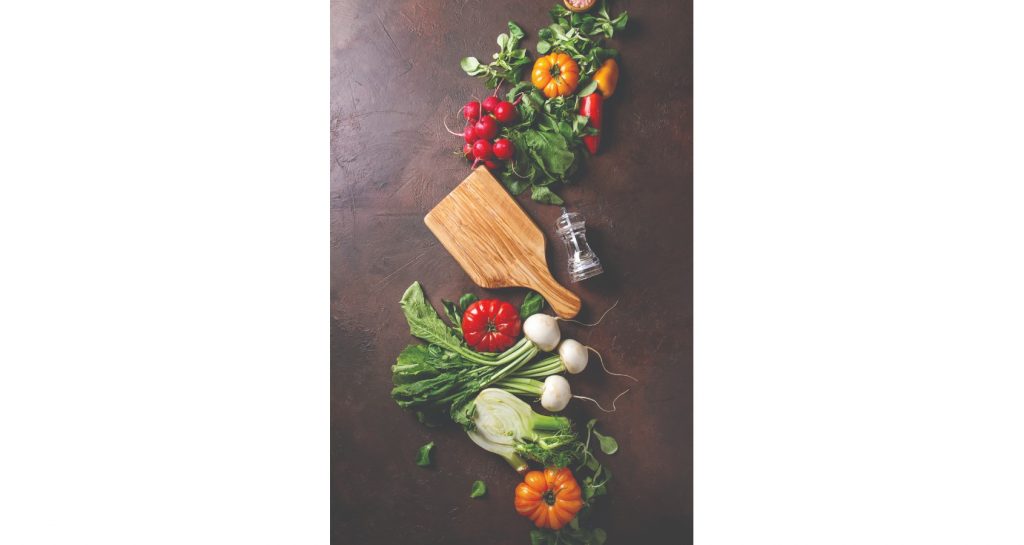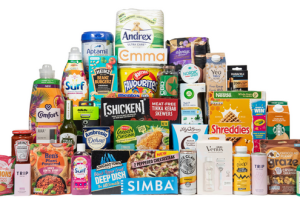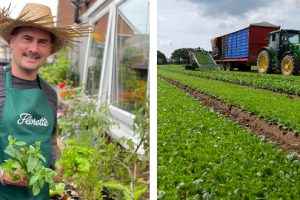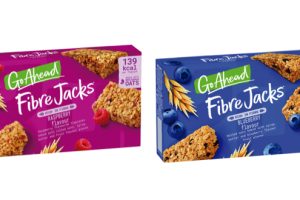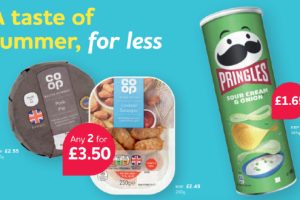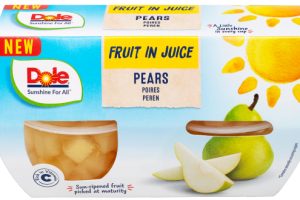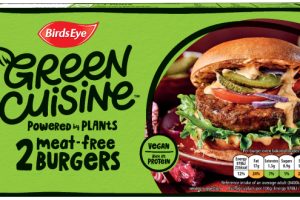While this is still yet to happen, the country has enjoyed finally being able to socialise with loved ones without social distancing restrictions. Many people were also looking forward to the on-trade opening back up fully and patrons flocked to their favourite bars, cafés and restaurants once they opened their doors in the summer and now, as we head into winter, we can look forward to a relatively normal Christmas. That is, if the latest Covid-19 variant does not chuck a spanner in the works.
These rapid changes have been reflected in the shopper trends of the year; while some 2020 trends have been carried over, such as the boom in at-home cocktails, this year there has been a fierce demand for sustainable products and a continued love of plant-based food and drink. As more consumers dabbled with cooking and baking more at home and looked to treat themselves with indulgent goodies, many brands have bolstered their product ranges with innovative flavours and tastes.
Flavour domination
One category dominated by new flavour launches over the past year was the alcohol category, which saw several flavoured spirits from well-known brands roll out into the sector. Kicking off the year with a Blackcurrant Royale flavour was gin brand Tanqueray, which introduced the new flavour in a 700ml bottle retailing at £25.
The gin features “juicy blackcurrants from France, warm vanilla and the exotic floral notes of black orchid” blended with Tanqueray London Dry Gin. Another new addition to the flavoured gin category was a Watermelon & Kiwi flavour from Whitley Neill, launched in February into Booker Wholesale, priced at £26 with an ABV of 43%.
Beefeater also launched a fruity flavour – Peach & Raspberry – at the end of April 2021, boasting an ABV of 31.5% and priced at £18.99. Bombay Sapphire went in a slightly different direction and launched Bombay Sapphire Sunset into its Special Editions range in a move designed to “appeal to gin fans’ thirst for exploration to discover new and exciting drinks”.
The spiced gin contains golden turmeric, Indian white cardamom and Spanish mandarin and retails at £23. The flavour joined existing Bombay Sapphire English Estate in the brand’s Special Editions range, which was launched in 2019.
Adding excitement
The vodka category in particular has tapped into the boom in popularity of flavoured spirits. Smirnoff launched a Raspberry Crush vodka in the summer, retailing at £16.50. According to Nick Payman, head of Smirnoff, the launch was a big step towards further invigorating and adding excitement to the vodka category.
Five months later, Smirnoff rolled out a Mango & Passionfruit Twist vodka, after Raspberry Crush generated “£6m in the first 10 weeks of launch”. Halewood Artisanal Spirits also tapped into the raspberry trend with the launch of JJ Whitley Blue Raspberry Russian Vodka, available in a bright blue bottle to reflect the colour of the liquid inside.
Watermelon was a popular flavour choice for many drinkers in 2021, so Absolut Vodka added a watermelon flavour to its line-up to satisfy this increased demand. Priced at £20 for a 700ml bottle, the variant has an ABV of 38%. The launch was supported by consumer PR, content partnerships and influencer activity designed to engage with the brand’s 18- to 34-year-old audience.
Rum innovation
Malibu also tapped into the trend for watermelon flavours with two new drinks. Malibu Watermelon is a pre-mix with Caribbean rum and watermelon, available in a 700ml bottle for £15. Malibu Watermelon Lemonade is available in a 250ml ready-to-drink can format (£1.80) and is a blend of Caribbean rum and watermelon, with lemon and lime flavours.
Other alcohol sectors also bolstered their ranges with flavoured drinks. Rum brand Captain Morgan expanded its portfolio in November with the launch of a Sliced Apple flavour. The 700ml bottle is priced at £16.50 and is supported by more than £1m of marketing investment in its first year.
The introduction of Captain Morgan Sliced Apple follows the launch of Captain Morgan Tiki in March 2020 and joins existing Captain Morgan Original Spiced Gold, Captain Morgan White Rum and Captain Morgan Dark Rum, as well as ready-to-drinkvariant Captain Morgan Original Spiced Gold & Cola. Irish whiskey brand Jameson added an orange flavour to its range in August, available in a 700ml bottle and priced at £23.95. The flavour was introduced to attract younger millennial and Generation Z drinkers.
Consumer appeal
Alcohol was not the only category to see a boom in flavour launches. Soft drinks, biscuits, snacks and confectionery manufacturers also bolstered their portfolios with new flavours to stimulate demand. Pepsi Max expanded its range with a lime variant in June 2021, available in two-litre bottles, 1.25-litre bottles, eight-can multi-packs and 24-can multi-packs.
According to brand owner PepsiCo, lime was voted the number one flavour for refreshment in consumer taste tests and flavoured colas are growing ahead of other soft drink segments – up by 6.5% compared with 2020. Another leading soft drinks brand, Tango, added a Dark Berry flavour to its sugar-free range in March 2021.
The flavour is available in 500ml bottles (£1.45/£1 price-marked-pack), a two-litre bottle (£2.59), a 6x330ml multi-pack (£3.49) and 330ml single cans (67p). Sugar-free choices are “of particular importance in the fruit carbonates segment”, according to brand owner Britvic, having grown by 18% in the last two years.
Flavour innovation has also influenced biscuit launches this year, specifically from leading manufacturer Pladis. The company added an Indulgent Chocolate Cherry variant to its McVitie’s VIB range. Priced at £1.79, the flavour joins existing Classic Caramel Bliss, Heavenly Chocolate Hazelnut and Luscious Blood Orange variants and aims to drive sales “particularly among younger shoppers”.
Almost three-quarters of shoppers aged between 16 and 34 are looking for more flavour innovation from sweet baked goods, says Emma Stowers, McVitie’s marketing director at Pladis.
She adds: “Cherry flavoured products are hot property at the moment – and new products incorporating this flavour grew by 23% over the past year.” Continuing with the cherry theme, Pladis also added Cherry and Passionfruit flavours to its Jaffa Cakes line-up, following the launch of a Pineapple flavour in 2020. Stowers says: “New products incorporating these two flavours increased by 73% and 23% respectively in a year.”
Hot topic
In the snacks category, Walkers kicked off the year with several additions. The brand partnered with KFC to launch two fried chicken inspired crisp varieties – Walkers Max Kentucky Fried Chicken and Walkers Max Double Crunch Zinger – available in 50g single bags (85p), 70g and 65g price-marked packs (£1), 140g sharing bags (£1.99) and a multi-pack of six (£1.70).
Walkers’ Quavers brand brought back its retro flavours – Prawn Cocktail and Salt & Vinegar – which were first launched in the 1990s. The flavours are available in single bags (65p), grab bags (85p), £1 price-marked sharing bags and a multi-pack of six (£1.50).
Spicy flavours were a big trend within crisps and snacks. Walkers added a Flamin’ Hot variant to its core range in multi-packs of six (£1.65), singles (69p), 45g grab bags (85p) and 65g price-marked packs (£1).
The crisps have a “distinctive” red colour and a “warming spicy kick”. Fernando Kahane, Walkers’ marketing director at brand owner PepsiCo, says shoppers aged 35 and under want new and different tastes, with spicy flavours particularly appealing to them.
Pringles tapped into the trend for spice with the launch of a Sizzl’N range, featuring three levels of heat intensity. Kickin’ Sour Cream (medium), Spicy BBQ (hot), and Cheese & Chilli (extra hot) flavours retail at £2.99 and were launched as research for the brand found 59% of millennials aged 18 to 34 prefer very spicy foods, making the new range a “perfect fit for those who can handle the heat”.
Pub classics
Premium crisp brand Tyrrells bolstered its portfolio with a British Beef & Ale flavour, in response to what is says is growing consumer demand for meaty flavours. The variant retails at 85p for a 40g single pack and was designed to be the “perfect accompaniment to your chosen drink”.
Kettle Chips launched its Steakhouse Barbecue variant into the convenience sector in June in 40g and 80g price-marked bags, following an initial launch in supermarkets earlier in the year. The brand says the move meets the demand for “real meat barbecue seasonings” in an under-represented market.
In demand
Within chocolate confectionery, the demand for orange-flavoured products continued into 2021 with manufacturers rolling out even more citrus variants on to the market.
Cadbury kicked off the year by making Twirl Orange a permanent member of its portfolio, following a limited edition launch in 2020. The brand says Twirl Orange was the number one new singles launch of 2020 and “one of the fastest-selling chocolate bars of the year”.
After announcing its impending arrival in December 2020, Mars rolled out Galaxy Smooth Orange in 66p single bars and £1.39 blocks. The company also launched Maltesers Orange Buttons in July. Nestlé Confectionery added an orange Yorkie bar in May, following a “resurgence in the popularity of orange flavoured chocolate in recent years”. The flavour is available in 46g single bars and 72g duo bars. Nestlé says orange-flavoured chocolate saw 23% sales growth in 2020.
As well as the popular orange, other more unusual flavours also made it on to the scene this year. Nestlé added a Mojito & Mint flavour to its After Eight portfolio, following the launch of a Gin & Tonic flavour in 2020. The variant was launched in September in 200g cartons, retailing at £3, and features Mojito and mint-flavoured fondant covered in dark chocolate.
Mondelēz International took inspiration from down-under by launching Cadbury Caramilk, a caramelised white chocolate popular in Australia, following research that found caramel is ranked the second most popular flavour in chocolate confectionery.
The variant launched in July in 80g tablets and 37g single bars, as well as price-marked formats, supported by social media activity and POS. The launch was aimed at helping recruit new shoppers to the Cadbury range, particularly millennials and young families.
Global commitment
There was also a huge focus on sustainability within food and drink this year, with leading manufacturers making packaging changes to help reduce their carbon footprint. Hellmann’s launched its squeezy bottle range in 100% recycled plastic as part of the brand’s “Real Taste and Less Waste” commitment.
The new packaging features a “New 100% Recycled Bottle” logo on the front of each pack. Brand owner Unilever plans to have the full range switched to the new packaging by the end of 2022. Andre Burger, vice president of foods and refreshment at Unilever, says: “With our new 100% recycled plastic bottles, which are also fully recyclable, we are providing shoppers with an accessible and simple way to help make their households and mealtimes more sustainable – while continuing to enjoy the products they love.
“Our Hellmann’s bottles are our first food brand in the UK to use 100% post-consumer recycled plastic, and while making the switch has not been without its challenges, these learnings will enable us to accelerate the move of other Unilever food brands to using more recycled plastic too.”
Suntory Beverage and Food Great Britain & Ireland rolled out fully recycled packaging for its Lucozade Sport brand in June, supported by a £6m investment. The roll-out also included a label design featuring recycling prompts to ensure the bottles can be sorted into the clear waste stream to be recycled back into bottles at UK recycling centres.
Recycled plastic
Britvic replaced its green 7Up bottles with clear recycled plastic as part of the brand’s commitment to change to 100% recycled plastic by October 2021. The new bottles are available across the entire 7Up range, including 7Up Regular, 7Up Free and 7Up Free Cherry, with 375ml, 500ml and 600ml bottles launching first this summer.
The new look includes a sustainability message announcing the 100% recyclable bottle on the front of the label and the wording “Clearly 100% Recyclable. Clearly 7Up” on the reverse. Britvic’s research has found that 40% of consumers would be more likely to recycle 7Up in a clear bottle.
Other manufacturers swapped out existing plastic packaging for cardboard alternatives. Italian cooking brand Napolina rolled out its core pasta products in recyclable cardboard packaging, in a move designed to remove up to 200 tonnes of plastic from the UK waste stream each year.
The brand previously moved its added value pasta lines, including Napolina Whole Wheat Pasta, Napolina 50/50 pasta and Napolina Bronze Die, into “artisan-inspired” recyclable packaging, which it said removed 16 tonnes of plastic. Neil Brownbill, commercial director for Napolina, says: “We know consumers are increasingly looking for products that are easily recyclable but also convenient and re-sealable.
“These new artisan-inspired cardboard boxes are 100% recyclable, are beautifully designed and very convenient for easy kitchen storage.” Ribena replaced its plastic straws with paper for its entire carton range, following a trial with Tesco in 2020. The move aimed to save up to 16 tonnes of plastic from being produced each year, as part of Ribena’s ambition to reach 100% sustainable packaging by 2030.
Huge appetite
While the sustainability trend has boomed this year, the demand for plant-based products continued across all categories within the convenience sector. Mondelēz International launched a plant-based alternative to its Cadbury Dairy Milk bar – Cadbury Plant Bar – which is available in Smooth Chocolate and Smooth Chocolate with Salted Caramel pieces.
The 90g bars are made with almond paste to provide a similar taste and texture to milk ingredients, while also offering a “hint of nuttiness”. The bars are wrapped in 100% plant-based packaging.
Louise Stigant, UK managing director at Mondelēz International, says: “With 500,000 participants in this year’s Veganuary – double the number of participants from the year before – the increasing public appetite for varied snacking options and plant-based alternatives has never been more apparent.
“At Mondelēz, evolving consumer demands have long informed our ambition to provide a wide range of products that work for everyone, and the new Cadbury Plant Bar range is the latest stop on this journey.” Nestlé Confectionery also rolled out a vegan chocolate bar for its Kit Kat brand, featuring “smooth chocolate blended with plant-based ingredients to perfectly balance the brand’s trademark crisp wafer”.
Alex Gonnella, marketing director for Nestlé Confectionery, says: “The most common request we see on social media is for a vegan Kit Kat, so we are delighted to be able to make that wish come true.” Haribo similarly bolstered its portfolio with two vegetarian sweets.
Booming markets
Alongside confectionery, the food-to-go category also benefited from plant-based additions. In October, Kepak launched a “meat-mimicking” burger under its Rustlers brand to “tap into the booming plant-based market”. Rustlers Meatless Maverick is available in One Stop stores and through the Booker Group, retailing at £2, and is made from pea protein.
The burger seeks to mimic the brand’s Quarter Pounder variant, complete with Rustlers “signature sauce” to “deliver on satisfying taste and convenience credentials”. Research from Kantar shows the £648.4m meat-free category is growing by more than 20%, with 27% of consumers who have never bought a free-from/alternative product planning to do so in future.
Merchandised within the meat-free fixture in-store, the product aims to generate incremental sales from the 55% of consumers who say they find the lack of convenience foods to suit their diet for snacking and eating on-the-go a “barrier to purchase”.
Hot dog brand Rollover also added a meat-free variant to its line-up this year, in a move designed to “support its customers’ needs for more meat-free options”. Rollover Meat-Free Burgers are also made with pea protein and, for retailers, come pre-cooked and frozen in packs of 60, alongside 30-packs of buns.
The brand says the meat-free category is “going from strength to strength”, growing by 15% year on year and predicted to be worth £1.1bn by 2024 as consumers “consistently seek more diverse protein options”. The category is being driven by flexitarians as well as vegans and vegetarians, and Rollover says 39% of meat-eaters are actively reducing their meat consumption.
Substantial growth
Elodie Bretz, head of marketing at Rollover, says: “The meat-free category is continuing to gain traction and as a leader in the hot food-to-go category, we knew we had to offer consumers a plant-based alternative to our best-loved burgers. With taste being the number one driver for consumers when choosing meat-free alternatives, it was vital we created a burger that was true to the Rollover brand and tasted great.”
There was also demand for more plant-based cheese alternatives. Bel UK, owner of the Babybel brand, launched a plant-based cheese range called Nurishh in July, consisting of a plant-based Camembert wheel (140g; £3.50), Cheddar & Mozzarella Style Blend Grated bag (150g; £2.50) and a Mozzarella Style Block (200g; £2.50). The brand says 36% of shoppers claim to be following or are interested in following, a flexitarian diet and 22% say the same for a vegan diet.
Chloe Feminier, plant-based commercial manager at Nurishh, says: “With taste highlighted as a key barrier to buying vegan products, and insights showing consumers seeking inspiration for plant-based recipes, the new additions to the Nurishh range bolster the offering, with varied formats ensuring a delicious plant-based option for every occasion and recipe.
Substantial growth
“With shoppers over 45 accounting for more than two-thirds of growth in plant-based products over the last four years, the delicious and versatile range will help retailers meet demand, attracting valuable shopper groups into their stores and locking in long-term loyalty.”
Boursin will be continuing this trend into 2022 by launching a plant-based alternative for its Garlic & Herbs soft cheese. Boursin Plant-Based Garlic & Herbs will be available from February 2022 in a 130g resealable format, retailing at £3. The brand says 86% of plant-based meals are being eaten by non-vegans and dairy-free cheese alternatives are growing faster than dairy cheese.
Celina Leroyer, senior brand manager at Boursin, says: “The plant-based market has grown substantially in the past year and Boursin Plant-Based has been developed following the identification of a gap in the market for speciality options.”
By Éilis Cronin, Content Editor
 Talking Retail Grocery and product news for independent retailers
Talking Retail Grocery and product news for independent retailers
